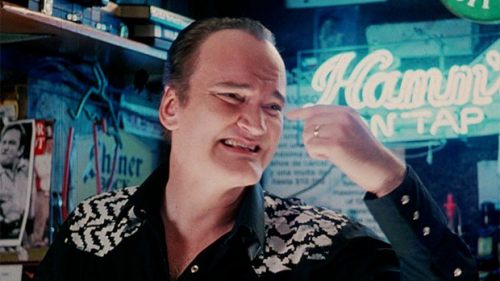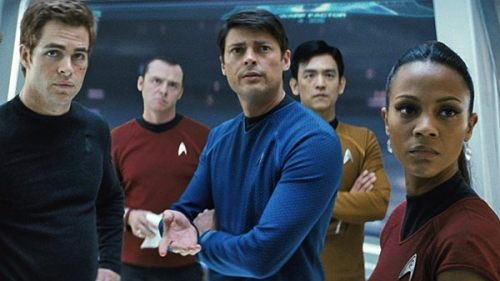INGLORIOUS BASTERDS And The Cathartic Benefits Of Scalping Nazis
Overlord is out now. Get your tickets here!
If there’s one thing that Overlord has reminded me, it’s that Nazis really do make for the perfect cinematic punching bag. Defined by bigotry and, often, the stupidity that informs their beliefs, yet still a force of power to be reckoned with in terms of sheer numbers and resources, the Nazi regime is the embodiment of the past century’s greatest evils, evils that unfortunately and terrifyingly live on to this day with a resurgence of power as authoritarianism takes hold across the world. That’s why, now more than any time within the era of the popular blockbuster, it is important that we are afforded the catharsis of seeing Nazis killed on-screen, to release the terror and heartache that real Nazis are spreading forth in the United States today. And if we were to look for a prime example of Nazi-killing fiction for the modern age, we only need to look back nine years to Quentin Tarantino’s Inglorious Basterds.
Now, detractors of the idea of violent fiction targeted at a particularized group would claim it is a form of propaganda, and in the sense that propaganda is the distribution of information to popularize a political point of view, that assessment is absolutely correct. But in that sense just about any popular art can be said to carry a message of political value, as politics are nothing more than the mechanisms by which we parse ideas and effectuate them as a society. The term “propaganda” largely received its negative connotations from its abuse by governments, like the Third Reich, who attempted to use misleading falsehoods to manipulate the masses, but that doesn’t mean that all propaganda from all sources must inherently be false in spirit or in moral righteousness, so long as fiction is clearly denoted as such. And fiction that postulates its portrayals of violence as corrections to injustice serves a beneficial societal purpose in its emotional release, helping us to keep our fear of a group like the Nazis in check by reassuring us that they are indeed surmountable.
Inglorious Basterds makes no secret of its framing as a modern propaganda film, creating a fictional platoon of Jewish soldiers to scalp Nazis on the audience’s behalf. In the film’s fiction, this team’s purpose is to strike fear into the hearts of the Nazi ranks through merciless dehumanization through scalping and branding the survivors so they must forever live with the shame of their Nazi affiliation. But for the modern audience, an audience that should justly revile the hateful message of the Nazi Party and their modern equivalents, the Jewish soldiers are a symbol of hope and catharsis. The hope is that we would be able to stand against a similarly terrifying swell of Nazism, with the Nazis' most famous casualties stepping up to lead in the revenge; the catharsis is to see the justice of retribution in a war that we didn’t fight ourselves and hopefully will not need to again. Hopefully.
But we are not so certain of Tarantino’s intent to deconstruct propaganda merely from his portrayal of gruff masculine Jewish heroes taking down Nazis, who are in turn shown to be almost uniformly impotent fools driven by their rage at that impotence, but because Inglorious Basterds deconstructs its own nature by examining the very nature of Nazi propaganda in the meeting of Fredrick Zoller (Daniel Bruhl) and Shosanna (Mélanie Laurent). Zoller is the golden boy of the Third Reich, a mass killer whose exploits are lauded as the height of fascist heroism, and the propagandistic inflation of his name has made him aggressive and entitled, making his fascination with the theater-owner Shosanna at once terribly pathetic and imminently terrifying. However, as Shosanna is recruited against her will to host the premiere of Zoller’s autobiographical film, she turns what was meant to be a coercive honor on behalf of a man and an administration that demand her compliance into an opportunity for political activism and propagandistic speech of her own.
Shosanna’s plot to burn down her theater with all the top Nazi officials inside would in and of itself be an enjoyable piece of revisionist history, only to be topped off by the bombastic addition of Jewish American soldiers gunning down Nazis like fish in a barrel. But Shosanna’s story isn’t merely about positing what might have been, but rather about the power that cinema has to stir powerful emotions within us through its propagandistic power. Shosanna doesn’t just burn down the theater, but lights her highly flammable film print collection, signaling the destruction of the Third Reich by the very mechanism of their social control. She doesn’t just start the fire without ceremony, but instead contrives to insert a film of herself into the projection of the Nazi art, provoking very specific emotions of confusion, outrage, and finally terror. If the Jewish platoon is effectively the embodiment of Jewish catharsis in front of the camera, then Shosanna is the creative force behind the camera, using the theater and the physical act of filmmaking to create a literal end to Nazism through their assumption that art cannot be used against them.
But of course, in order to be seen as a true threat, cinematic Nazis cannot only be a bumbling bunch of incompetents, for otherwise we only have our metafictional understanding of Nazi rule to inform their fictional eradication, which in turn makes for cognitive dissonance when realizing that while Nazis are predominated by stupid prejudices from leaders who prioritize bigotry over governance, they were still a tactically and numerically formidable force in World War II. Enter Colonel Hans Landa (Christoph Waltz), a character who serves as both this film’s expression of intelligent malice, but also as a deconstruction of what it means to be such a figure. See, it’s not explicitly clear that Landa has any particular feelings against the Jewish people, even as he compares them to rats while viewing the German people as ethnically similar to hawks in a speech more important for its objectives than its contents. What is clear, however, is that Landa is very good at two things: sussing out information that he can use to his advantage and performing Nazi strength to get people to submit to his will. The former is the skill that leads him to attain his level of respect and power within the Nazi ranks as the “Jew Hunter,” but it’s the latter that is most interesting because it is, by its very nature, performative.
Landa is prone to long speeches to captive audiences, and these speeches are designed to demonstrate that those audiences are indeed captive and that Landa has the luxury of toying with his prey, operating under the belief that he has already won. In the opening scene where Shosanna’s family is killed beneath the floorboards of their host’s home, Landa cannot know of the Jewish presence in the home until he convinces the home’s patriarch to confess it to him. He uses deductive reasoning and is ultimately shown to be right, but this is all a show for that patriarch’s – and consequently the audience’s – benefit to demonstrate that Landa wouldn’t need to be justified in destroying the man’s home; he could just demonstrate his power by letting his soldiers shoot up the place whether there were Jews there or not. But by demonstrating his intellectual and manipulative prowess, Landa reinforces the notion of Nazis as an unstoppable force, one that can always find what they’re looking for and will show no hesitation of taking it, no guesswork or unnecessary extension of effort required.
But for Landa, unlike many enlisted Nazis who are invested in the war for bigoted reasons, the Nazi Party is simply a means to empower himself, something that becomes apparent in the film’s final scenes where Landa is using his performative flourishes to betray his country. Landa demonstrates through this act that fear and bigotry may be the tools by which fascist propaganda seeks social control, but it’s ultimately the pursuit of individual power that drives many Nazi officers like himself, that the performance goes only so deep as the costumed uniform he wears and that he would gladly dismiss it should the opportunity for personal enrichment show itself. This is why it is so damn satisfying to see Landa branded with the carved Swastika in the film’s final seconds. We don’t hate Landa because he necessarily hates Jews or because he believes in the causes of the Nazi Party. Landa is the ultimate evil of Inglorious Basterds because he embodies the Nazi lust for power at all costs and because his performance is the daily propaganda that enabled their platform of fear to dominate Europe for more than a decade.
Tarantino’s film is at one level a piece of wish-fulfillment, a thought experiment on a different conclusion of World War II that placed the power firmly in the hands of the people most hurt by Nazi dominion. But on a deeper level, Inglorious Basterds is a testament to the power of cinema, that flickering lights on a screen have the power to radically change our world as the performances they display stoke our emotions. It absolutely should feel good to see Nazis suffer, so it might just be time for our cinema to embrace that emotion and give us all the catharsis necessary to survive the rising tides of darkness.



